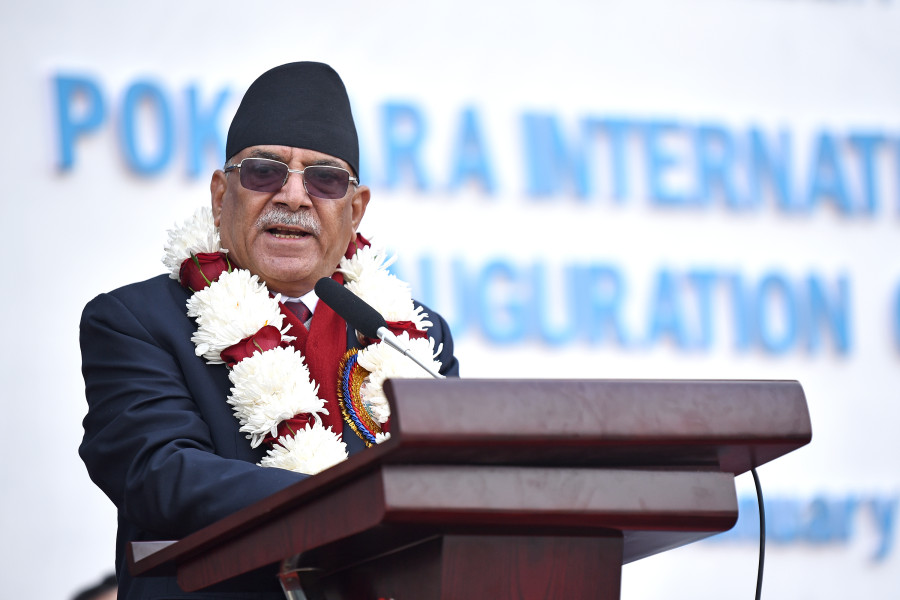Columns
Prachanda: An epitome of survival
During his electoral campaigns, Prachanda admitted that aligning with KP Sharma Oli was a tragedy.
Sambridh Ghimire
Back in 2009, when the Maoist government was in power, I’d read an article that compared the Maoists to Hamas. It speculated that despite different external circumstances and interventions, the Maoists would also tread the path of Hamas, slowly departing from mainstream politics. Today, Hamas remains a powerful militant force in the Gaza strip. But the nation has become a great game for Israel, the Futahs and Hamas. Fortunately, Nepal did not depart on that turbulent path.
The Maoist insurgency took the lives of around 15,000 Nepalis, but their exit was peaceful. However, the actions that led to their departure from the government were totalitarian. After this, there were opinions that this would slowly make the Maoists and their leader Prachanda inconsequential in the policy of Nepal. But history shows that Prachanda did not let the hypothesis become a theory. It has been 12 years since Prachanda was ousted from the government, but he has become the premier of the nation two more times.
Parasitic relationship
Prachanda has used the skills he acquired during the civil war in contemporary politics as well. Having spent ample time in the woods, he seems to have imbibed the parasitic instincts of flora and fauna there. A parasitic relationship is a symbiotic relationship in which one organism (the parasite) benefits at the expense of another (the host). The parasite relies on the host for survival and may cause harm to the host, either physically or by consuming resources that the host needs. His political career started with his flirtations with the monarchy, in which he wanted to align with King Birendra against the parliamentary parties. This was because he wished to have a parasitic relationship with one of the political forces and weaken the other. A few years later, he used the same tactics while aligning with the Seven Party Alliance, and forged a battle against the monarchy, consuming monarchy as an institution. Instances of this type of powerplay in his life outnumber his limited achievements.
After the first election, Prachanda reached a “gentlemen's agreement” with Girija Prasad Koirala to make him the first president of Nepal. But he soon backed off in his quest for absolute power. Tales of his nepotism and newfound wealth spread during his short stint as prime minister. The poor and landless felt he did little to redistribute resources. Thousands of people continued to leave the country looking for work. He was accused of muzzling the press. He attempted to sack the army chief, alienating an already suspecting military establishment. Prachanda eventually resigned, furthering instability and leading the party to electoral defeat. Many in Nepal thought that this was the end of Prachanda's political spell. But all were proven wrong. He went on to become prime minister in 2016 and in 2022.
Guerrilla warfare
Consider another strategy that Prachanda used during his wartime days. One of them is guerrilla warfare, which is a type of irregular warfare in which a small group of combatants, such as paramilitary personnel, armed civilians, or irregulars, use military tactics, including ambushes, sabotage, raids, petty warfare and hit-and-run tactics. Guerrilla warfare is often used by groups seeking to fight a larger and more powerful force, such as an occupation army. On the other hand, they may be used by groups with a smaller military capability to resist an occupation or a more significant military force.
Prachanda's political strategy involves ambushing and sabotaging. A few of his early ones were to his colleague and friend-turned-foe-turned-friend Baburam Bhattarai, during the civil war and after the latter's stint as prime minister. Madhav Kumar Nepal, catapulted by Prachanda to the post of president, had a steep fall after the latter went back on his word. Shortly after the election results, Madhav Nepal was again ambushed by Prachanda when he was left with the Congress, and Prachanda brokered ties with Nepal's mother party, the CPN-UML. Recently, Prachanda reached out to Madhav Nepal, asking him to join the Maoists-led government. One can wonder if Nepal is up for a double ambush in a span of a month. KP Sharma Oli was a casualty of Prachanda's hit-and-run tactics when the latter withdrew his support from the government to become the premier for the second time. Sher Bahadur Deuba is a textbook example of Hegel's saying that history repeats itself twice. Prachanda ambushed him right before the federal elections of 2017 and raided the electoral success of the Congress Party yet again after the elections to sabotage Deuba and form an alliance with KP Sharma Oli, perfectly exemplifying what Marx added, satirically, Hegel's saying, "History repeats itself twice, the first time as a tragedy and the second time as a farce." During his electoral campaigns, Prachanda admitted that aligning with KP Oli was a tragedy and isolating Congress was one of his biggest regrets. Yet, again due to his survival instincts, he has led his crew of frivolity to Singha Durbar yet again.
Tactics and results
Although from a normative point of view, these strategies and tactics have corrupted the political practice of Nepal. It has also taken away idealism, morals and values from Prachanda as an individual. But empirically, Prachanda and the Maoist party have gained much from these iniquitous contrivances. The Maoists' electoral graph has been in a steady decline, from around 29 percent in 2008, falling to 15 percent in 2013, declining to 14 percent in 2017, and diminishing to 11 percent in 2022. Their seats share in the Parliament has fallen from 38 percent, 14 percent, 19 percent, and 12 percent, respectively. Despite this, they have led all the resulting governments, except from 2017. They have held strong portfolios in all the governments and have the same, if not more, access to state resources as their counterparts. This has been due to Prachanda's survival instinct and his renegade.
If the word snollygoster were to apply to anyone in the 21st century, Prachanda would beat all others by a significant margin. As the great American novelist William Gaddis once observed, “Power doesn’t corrupt people, people corrupt power”. Is it Prachanda who has corrupted the power play in Nepali politics, or has Nepali politics corrupted Prachanda?




 9.12°C Kathmandu
9.12°C Kathmandu















